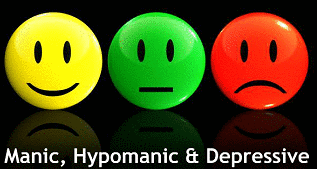BIPOLAR AFFECTIVE DISORDER TEST: Look for these ten indications ruled by the illness for a diagnosis.
Bipolar affective disorders are in fact subtle mental conditions. They are most marked by alternating periods of elation and depression – as a rule.
Bipolar disorder was formerly known as manic depression. It gets broken down into two main categorizations based on the length and severity of an individual’s mood state changes.
The illness affects almost one million adults in the United Kingdom.
When it comes to mental illness and mood problems, a person suffering bipolar affective disorder displays several signs and symptoms which are subtle – but recognizable.
You can use these ten key indications and pointers to help determine whether a loved one may have the mental condition. Or, could it be that they are currently dealing with personal problems or they generally have a quirky personality?
A Test for Ruling Out Bipolar Disorder
These 10 indications and signs could either rule out the likelihood of someone suffering with bipolar disorder, or identify that someone you care for may have the illness.
If so, you can learn how to help them deal with it by understanding the typical signs.
1. Depression
Often, an individual in a bipolar depressive state will present themselves much like someone who has depression. They display similar daily problems along with sleep issues. They will have a lack of appetite, a lack of energy (lethargy), and an inability to focus or concentrate.
Primary defining factors for people with bipolar disorders are exhibiting manic and depressed state symptoms.
2. Intensely Happy Moods
Intense happiness may be a sign of hypomania. It is a high-energy state in which a person feels exuberant – but usually retains their grip on reality.
According to the ‘10 rules of happiness‘ being happy is healthy! But, an ‘unusually’ intense happy mood may in fact be a warning sign of a person in a manic state.

3. Rapid Pressured Speech
Rapid racing thoughts and pressured speech is widely accepted by clinicians as one of the most common symptoms of bipolar disorder.
It occurs when someone is really not involved in a two-way conversation. They have racing thoughts or extremely fast speech which is a symptom of manic moods.
They will feel like their mind is racing. They are unable to control or slow down their thoughts – as seen in their pressured speech.
4. Difficulty Finishing Tasks
Having a house full of planned tasks is a normal part of life and living. But, having multiple unfinished or half-completed projects is a typical hallmark of bipolar disorder.
Someone in a manic state will feel capable of completing large projects. But, the tasks will seem impossible to complete when their mood suddenly changes into depression. At that point, even the simplest of tasks will seem overwhelming.
5. Irritability
Changing moods abruptly from being happy to becoming depressed, or rapidly reaching an irritated state, could signify a depressed mood. Experiencing symptoms of mania and depression at the same time is an irritable condition known as ‘mixed mania’.
6. Troubling Problems at Work
Bipolar affective disorder symptoms and sudden mood swings can interfere with an ability to show up for work. They will find it difficult to function as an employee and interact productively with others in the workplace.
Related Article: Mental Health Benefits of Playing Table Tennis for Seniors.
7. Substance or Alcohol Abuse
Alcohol or drug abuse is quite common among people who are depressed. People drink when they are in a manic phase to try and slow themselves down. Abusing alcohol or substances seems to improve their mood when they get depressed.
8. Impulsive Erratic Behavior
People with bipolar disorder often display an inflated self-esteem when they are in a manic phase. It often results in sporadic spending sprees and unusual impulsive sexual behavior.
9. Sleeping Problems
Depressive phases often cause sufferers to sleep too much and feel tired all the time. Conversely, during a manic phase, individuals may not sleep enough, but feeling excessively tired. Sleeping problems may correlate with the current state as a person moves from one state to another.
For example, a person may have difficulty sleeping in a manic state. But, they may not have the energy to get out of bed in the depressed state.
10. Bipolar Affective Disorder Health Care
There is a lot of professional health care help available for people with bipolar disorders. The best advice is to seek the assistance of a mental health clinician if you or someone you know is displaying these symptoms.
Note: Keeping a journal of events may help you provide objective clarification on any significant mood states and symptoms.

